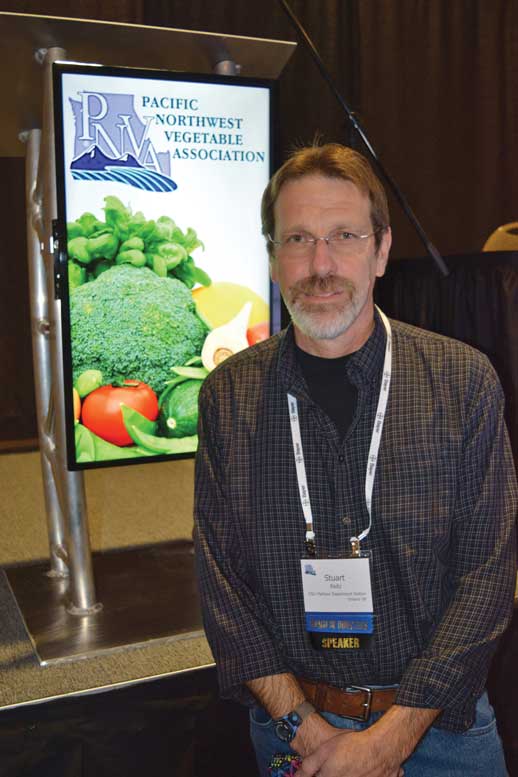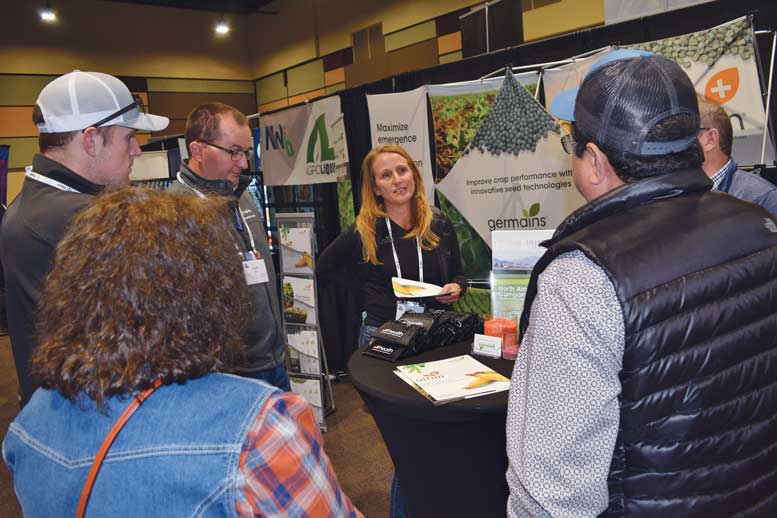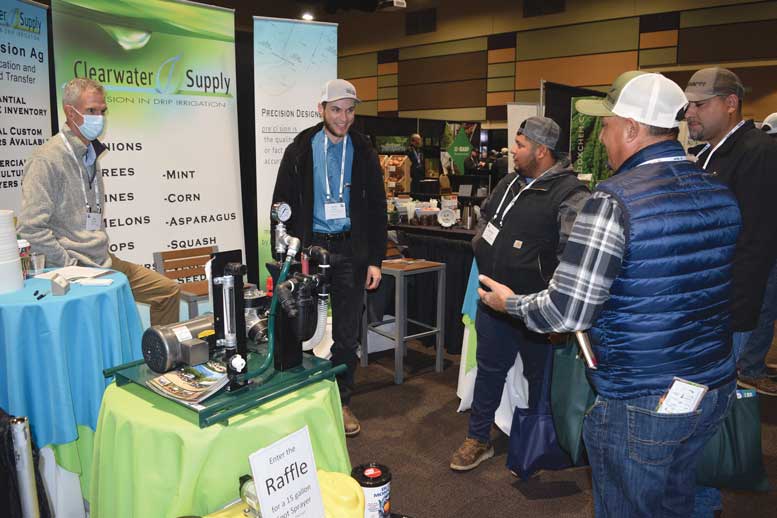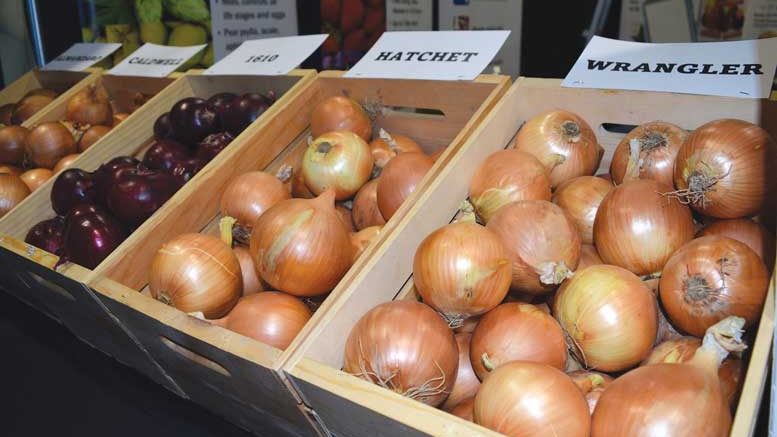|
Click to listen to this article
|
Story and photos by Denise Keller, Editor

Growers, researchers, vendors and others in the industry reunited at the Pacific Northwest Vegetable Association Conference in Kennewick, Washington, Nov. 17-18. Following the 2020 online event, attendees were glad to be back in person to check out the newest products displayed in the trade show and the latest news presented in the education sessions.
The onion session kicked off with a discussion of the industry’s loss of chlorpyrifos and the status of the search for suitable alternatives.
EPA Ruling
Alan Schreiber with the Agriculture Development Group began with a recap of the recent revocation of chlorpyrifos tolerances. Although the insecticide, commonly sold as Lorsban, has waned in popularity in some onion production regions due to resistance issues, growers in areas such as the Columbia Basin and Treasure Valley have continued to rely on the chemical, primarily for maggot control.
That is until the EPA, in effect, “pulled the plug on chlorpyrifos,” Schreiber said. In August 2021, the EPA revoked all tolerances for residues of chlorpyrifos on food or feed crops; tolerances expire Feb. 28, 2022. The ruling does allow for onions in storage that were treated with chlorpyrifos during the 2021 growing season to be sold. However, applications of chlorpyrifos after Feb. 28, 2022, that result in detectable residues on onions will not be allowed to enter commercial channels.

Various groups including the National Coalition Against the Revocation of Chlorpyrifos Tolerances are trying to fight or delay the EPA ruling, but Schreiber does not expect any success.
“Chlorpyrifos is going away. We are not going to get it back. Our best option is to find alternatives,” he said. “EPA’s approach is strikingly sudden, thoughtless and unforgiving. This is very uncommon, almost unheard of. They always have a phase-out period for this. I’ve never seen something like this. This is an unusual situation, and there’s no reprieve from this.”
Other chemical products are undergoing regulatory scrutiny, as well, and may have trouble surviving re-registration. Schreiber mentioned that Walmart has said the company is no longer going to accept produce treated with neonicotinoids, although that has yet to be enforced.
“We’re concerned about the direction that this is going. It is appropriate for you to be concerned about continued access to organophosphates and carbamate products. A lot of these products aren’t used very often, but often when you need them, you really, really need them,” Schreiber said.

The loss of chemicals will likely continue, the speaker concluded, so it’s important for the industry to defend the products that are available and support agriculture research efforts to generate data and develop new alternatives.
Alternatives and Management
Stuart Reitz with Oregon State University (OSU) followed with a report on the search for suitable alternatives to chlorpyrifos and management recommendations for the upcoming season.
Prior to EPA’s chlorpyrifos tolerance revocation, Oregon had placed additional regulations on the insecticide. As a result, the Oregon Department of Agriculture has been prioritizing research into alternatives.
A trial at the OSU Malheur Experiment Station compared the efficacy of newer insecticide seed treatments to the standard Lorsban application. The trial evaluated five seed treatments (F1500, Regard, Cruiser, Trigard OMC, untreated control), each with and without the addition of Lorsban. Researchers monitored maggot flies, plant stand, maggot damage and crop yield. They found that all the seed treatments reduced losses to maggots and that chlorpyrifos did not enhance the control of the seed treatments.

“Lorsban had no beneficial effects any way you slice it,” Reitz said. “All of these seed treatments significantly reduced losses due to maggots, so that’s good news. And it surprised me that chlorpyrifos performed so poorly, but that’s what we found.”
Reitz pointed out that the data is from just one year of the trial, and more research is needed.
“Where do we go from here? Keep in mind that while seed treatments worked pretty well, they did not completely avoid losses due to maggots. The maggots are still feeding on the plants, so you still have the opportunity for damage and plant death to occur. So you can’t rely just on those seed treatments or any insecticide treatment as a standalone management,” Reitz said.

Since there are no rescue treatments for maggot infestations, management is preventative, Reitz said. Growers should reduce the opportunity for maggots to survive and reproduce by disposing of cull onions and volunteer onions. Avoid planting back-to-back onion crops in the same field or planting near cull piles, Reitz advised, noting that maggot flies typically don’t travel more than a mile. Also avoid planting in fields with high amounts of organic matter or plant residues. Delay planting as long as possible to promote warmer soil temperatures and faster plant development. And finally, cover seed rows and reduce the exposure of seed to flies.
Reitz closed with a reminder that insecticide resistance is always a concern, especially in maggot control, so growers should consider rotating seed treatments.
